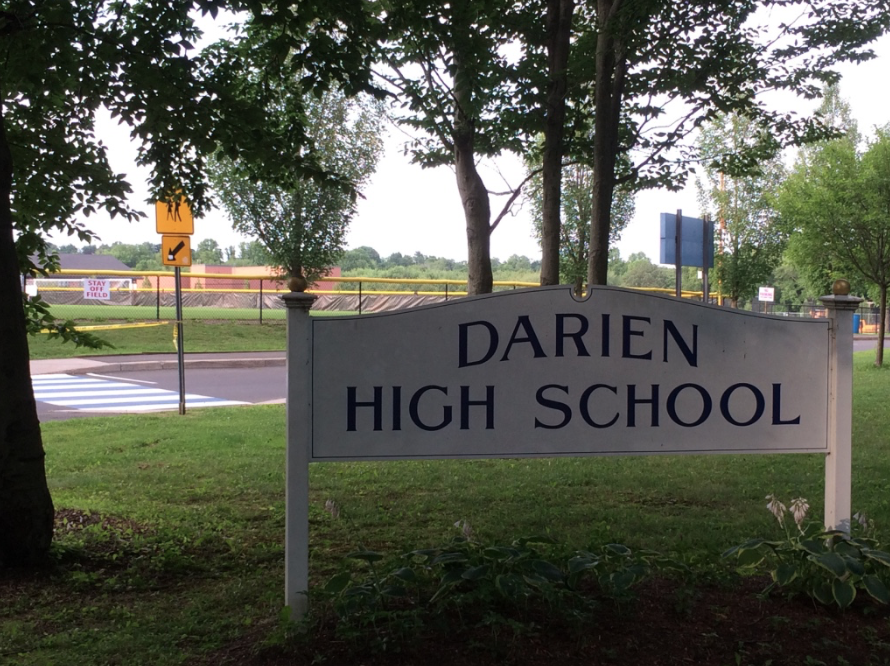With many high school students concerned about the recent police killing of George Floyd in Minneapolis and dramatic events sparked by it, Darien High School sent an email Thursday morning to parents with web links to information geared toward students on racism and police violence.
DHS Principal Ellen Dunn sent the email. Among the resources it points to are several that her message emphasized, including links to:
— an interview with “a clinical psychologist at the University [of Pennsylvania] studying racial literacy and racial trauma”
— a project of the Southern Poverty Law Center, has detailed materials for educators and families on teaching about race, racism, and police violence
— three links to Web pages with information “for educators in how we can proactively help children think about and process these difficult ideas” from the National Association for School Psychologists, which was being used by the school district for guidance in addressing the topics with students.
- “As events unfold around the country, the Darien Public School District joins other organizations and individuals in the call to action to address and end systemic racism. […]
- “As a District, we are sharing resources with the community that will guide our work moving forward in the race conscious education of our students and support your discussions as families.” […]
- “Engaging in difficult conversations is a critical step in fostering acceptance and embracing differences. We encourage you to speak with your children about these issues as we will in our classrooms. We are available to provide additional support for your families if there is a need at this time.”
DHS Principal’s Message
Here’s the full text of Dunn’s email to parents, sent Thursday morning:
June 4, 2020
Dear families,
As events unfold around the country, the Darien Public School District joins other organizations and individuals in the call to action to address and end systemic racism.
Locally and nationally, many have joined non-violent protests and other peaceful demonstrations. We are amidst uncertainty on many fronts and the conversations we engage in with our children have never been more important.
As a district, we are sharing resources with the community that will guide our work moving forward in the race conscious education of our students and support your discussions as families.
Teaching Tolerance, a project of the Southern Poverty Law Center, has detailed materials for educators and families on teaching about race, racism, and police violence.
These resources are critical in helping children understand how to talk about race and accountability. Teaching Tolerance has collated a library of leveled student texts related to themes of understanding race and racism. You can find this library of texts here: Student Texts.
Similarly, the National Association for School Psychologists (NASP) has developed and released helpful information for educators in how we can proactively help children think about and process these difficult ideas. The District will continue to utilize this resource to guide our instruction.
We are all grappling with how to speak with children about the complex and difficult events occurring in our world, from the continuing public health crisis to the demonstrations and riots occurring across the country.
The University of Pennsylvania Graduate School of Education conducted an interview with Dr. Howard Stevenson, a clinical psychologist at the University studying racial literacy and racial trauma.
The interview focuses on how to talk to children after racial incidents and can be found here: Dr. Stevenson Interview. Stevenson outlines three key strategies for having a conversation with your child after a racial incident. This three-step plan includes:
- Embrace your child’s difference. Make it clear how much you care about her, how her difference is a gift, not a liability, and how not everyone will view it as a positive.
- Correct misperceptions the world has about people who are diverse. We certainly know the adult world is filled with misinformation after a racist incident makes news. Kids hear that too. Help them better understand that no one is less human than another.
- Monitor your child’s emotions before, during, and after the conversation. Say, “this is an ongoing conversation.” You’re going to keep talking about these issues and they should too. When another incident makes headlines, follow up.
The District is committed to engaging students and families in ongoing conversations to support an understanding of the critical need for change. Engaging in difficult conversations is a critical step in fostering acceptance and embracing differences.
We encourage you to speak with your children about these issues as we will in our classrooms. We are available to provide additional support for your families if there is a need at this time.
Sincerely,
Ellen Dunn
Additional resources:
Edweek.org: Resources for discussing police violence, race, and racism with students
Oakland Public Library: Resources for talking to kids about racism and justice
Teaching Tolerance: Resources for teaching about race, racism, and police violence
NASP [National Association of School Psychologists]: Call to action to end racism and violence against people of color
NASP: Resources on social justice
NASP: Understanding race and privilege
American Psychological Association: Talking to kids about discrimination
Early Childhood Education Assembly: Resources for educators focusing on anti-racist learning and teaching
Cult of Pedagogy: A collection of resources for teaching social justice
CSDE [state Education Department] Recommendation How White Parents Can Use Media to Raise Anti-Racist Kids

